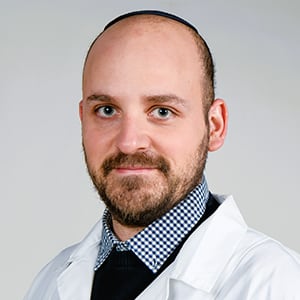
Benjamin Stern
Cataract and refractive surgeon and founder of the Biomedical Optics Research Lab at Hadassah Medical Center, Jerusalem, Israel
False

Cataract and refractive surgeon and founder of the Biomedical Optics Research Lab at Hadassah Medical Center, Jerusalem, Israel
Benjamin Stern’s work focuses on ocular optics, particularly intraocular lens (IOL) design and performance. He is affiliated with the Rothschild Foundation Hospital in Paris, France, where he completed a fellowship under the mentorship of prof. Damien Gatinel. Benjamin says prof. Gatinel is “without question, the most exceptional mentor I could have hoped for – he embodies the ideal of a scientist-surgeon: intellectually rigorous, mathematically precise, and deeply insightful.”
“I could share countless examples to illustrate [Gatinel’s] influence,” he adds, “but one stands out: throughout my fellowship we co-authored many articles. I often sent him drafts late at night, believing I was working beyond normal hours, only to receive his detailed feedback just a few hours later. That quiet dedication taught me more than any direct instruction ever could. Unlike mentors who lead through pressure or urgency, Professor Gatinel leads entirely by example, and that example is powerful enough to inspire excellence without a single word.”
Benjamin is also deeply grateful to another mentor, Michael Halpert, who guided him through his first cataract surgeries, noting that it was his “calm demeanor and quiet confidence” that taught him that the surgeon should always remain “the calmest person in the room, regardless of the situation.”
In terms of the technological advances he feels have most benefited the cataract & refractive in recent years, Benjamin says: “When I began my internship, cataract surgery was primarily viewed as a reparative procedure – its success measured by the anatomical replacement of a cloudy crystalline lens with a clear IOL. Today, the landscape has dramatically evolved. Advances in ocular biometry, IOL power calculation formulas, and – most notably – innovative IOL designs have transformed cataract surgery into a true refractive procedure. Patients now expect not only clear vision but also freedom from glasses – and many even seek correction for presbyopia, a common age-related condition that often develops decades before cataracts. These technological advances have made it possible to restore youthful vision, which is truly remarkable.”
Benjamin hopes to continue his work at the Anterior Segment Unit of Hadassah Medical Center under the guidance of Itay Lavy (“an outstanding cataract and cornea surgeon known for managing some of the most complex cataract cases”). With Itay Lavy, Benjamin is working on delivering the highest standard of care to their patients, “from treating inoperable cases and surgical complications to helping active individuals achieve complete spectacle independence.”
Benjamin also continues to collaborate with Damien Gatinel, developing “scientifically robust, computer-assisted tools that will help surgeons select the optimal IOL model and power for each patient.” This complex but rewarding endeavor aims to reshape global surgical standards. “In today’s world of advanced IOL technologies, we can no longer rely on simplistic optical models like paraxial approximations or basic Snell’s Law,” says Benjamin. “Instead, we must integrate sophisticated principles from fields such as imaging science, aerospace engineering, and telecommunications. Stay tuned: exciting developments are on the horizon!”
Dive deeper into the world of Ophthalmology. Explore the latest articles, case studies, expert insights, and groundbreaking research.
Receive the latest Ophthalmology news, personalities, education, and career development – weekly to your inbox.

False
False
False
The Ophthalmologist website is intended solely for the eyes of healthcare professionals. Please confirm below: